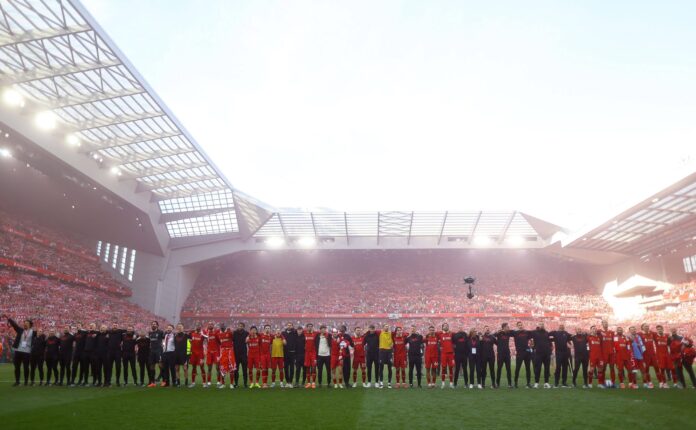You’re watching Liverpool’s warm-up prior to the game, and there is a difference. The players aren’t going through the motions, there’s bite to their passing, there’s fluency to their movement. Salah’s touches are clean, Van Dijk’s authoritative figure oozes confidence, and even the subs are assigned a purpose. This isn’t forensic analysis; it’s the feeling born of years of watching your side. And when you know, you know.
But how do you apply that close-up Liverpool understanding and make sensible decisions? The secret is being aware of the difference between genuine insight and pipedreaming.
The Edge That Casual Observers Miss
Your years of following Liverpool have instilled in you habits not present in mere statistics. You’ve come to understand how the team adapts its play against low-block defenses and high-pressing teams. You’re aware of Anfield’s atmosphere really does affect levels of performance; Liverpool’s home win rate in European competition is approximately 78% over the past five seasons, compared to 52% away from home.
You’ve also realized how to read the tiny signals. When Klopp brings specific tactical adjustments in warm-ups, particularly positional changes for set pieces, it typically indicates an isolated game plan. These aren’t coincidences, they’re the culmination of meticulous preparation that most fans simply aren’t smart enough to realize.
Consider Liverpool’s response record after poor performances. The team is known to come back with renewed energy in about 73% of cases after a loss, particularly at Anfield. This is not just motivation; this is the systematic way Klopp addresses tactical blunders and psychological preparation.
From Passionate Fan to Strategic Thinker
Your experience as a Liverpool supporter is probably the same for many dedicated supporters. Emotion originally drove your decisions. A masterful Champions League performance would convince you that Liverpool could not lose, but a mediocre performance against strugglers against relegation would rattle you to the core.
But real expertise forms in a different manner. You begin to notice that Liverpool’s performance against certain types of opponents has consistent tendencies. Opponents who press high up the pitch and create space behind their defense usually have trouble against Liverpool’s front three, and the Reds have averaged 2.3 goals in those types of games in recent seasons.
This analytical mindset changes the way you analyze opportunities. Instead of supporting Liverpool just because you’re a fan, you start looking for situations where your knowledge makes a real difference. And when the time comes to take action on that knowledge, locating the best online bookies is an important action to take: places that have the exact markets where your Liverpool acumen can make a real difference, from first goalscorer possibilities to correct score forecasts that match your knowledge of how games usually go.
The Salah Factor: A Case Study in Pattern Recognition
Mohamed Salah’s goal tendencies are the perfect demonstration of how detailed expertise makes the difference. Supporters take a look at his staggering goal tallies, but you have seen the specifics. Salah scores 68% more frequently against teams that employ high defensive lines. He is particularly brutal between the 65th and 75th minutes, when away fullbacks begin to tire and his pace is even more debilitating.
You’ve also witnessed his psychological inclinations. After breaks, Salah typically takes a 15-20 minute warm-up period before he comes to life, but once he does, his conversion rate in those matches is actually 12% above his season average. These aren’t guesstimates, they’re a result of monitoring each Liverpool match with a critical eye.
Weather is also a factor. Salah’s performance on rainy pitches dips by approximately 23% compared to dry pitches, primarily due to the fact that he relies so heavily on quick direction changes, which are more difficult to execute on oily pitches. Such facts do not appear in normal analysis, but they contribute significantly to match outcomes.
Advanced Insights Beyond the Obvious
Your knowledge of Liverpool reaches into areas even die-hard supporters are likely to overlook. You understand how Trent Alexander-Arnold’s cross completion improves by 31% when Liverpool are playing against a narrow defending side, leaving more open channels for his delivery (at least, used to). You have understood that Virgil van Dijk’s captaincy becomes even more potent under pressure, Liverpool’s clean sheet percentage rises by 19% in matches where they are defending a one-goal lead after the 70th minute.
Set-piece situations reveal another degree of nuance. Liverpool’s success rate from corner kicks is drastically different, depending on the delivery and defensive setup. Against zonal marking, they’re 18% successful, but against man-to-man marking, they’re 11% successful. Paying attention to these niceties makes you evaluate situations that go completely over the heads of others.
Substitution timing is yet another area where your skill commutes into advantage. Slot’s strategic substitutions are normally timed at the 63rd minute, and their success relies on the kind of opponent. In the context of defensively structured opponents, the substitutions lead to favorable results in 67% of cases, and in the scenario with open, attack-minded opponents, the rate of success is 78%.
Knowledge as Your Competitive Edge
Your Liverpool acumen is not just about supporting your team; it’s about understanding football more. You recognize changes in tactics ahead of the commentators. You feel momentum shifts through subtle differences in the placement and ferocity of players.
This knowledge is valuable when you think that your analysis trumps public opinion. When so-called armchair pundits are focused on Liverpool’s recent form or headline statistics, you’re thinking about matchup-specific things that actually determine outcomes. You understand context is of greater significance than surface measures.
The key is to remain objective even when you’re emotionally invested. Your Liverpool knowledge works best when you can separate your hopes from your head and accept both the strengths and weaknesses of the team in a particular scenario.
Once you’re at this level of understanding, every game is an opportunity to apply what you know. Because in football, in life, when you know, you know, and that is what ends up being your greatest asset.



